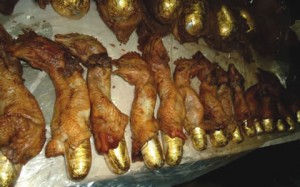I’ve chronicled my fear of botulism many times before. I still can stuff, but I really pay attention to what I’m doing.
Dried fish and botulism seem to go together. Five bot cases in Germany and Spain were linked to dried fish in 2016.
There were 90 illnesses and nine deaths in 2017 from foodborne botulism in Ukraine. That’s a lot. Fish were a factor in many of these illnesses.
According to Outbreak News Daily, two unlucky Nigerians have died from botulism after consuming fish.
Three family members contracted suspected foodborne botulism, resulting in the deaths of the father and mother, according to the the Nigerian Centres for Disease Control (NCDC). Fish appears to be the common food source.
The event descriptions of the two fatalities is provided by the World Health Organization (WHO):
The woman, a 47 year-old, presented to King’s Care Hospital, Abuja, on 7 January 2018, with vomiting, fever, sudden blurring of vision, generalized body weakness, dysphagia and odynophagia, and left ptosis. She was semi-conscious. She was initially diagnosed with ischaemic heart disease, with esophageal stricture and central retinal vein thrombosis. However, her neurological symptoms worsened rapidly, progressing to complete bilateral ptosis, paralysis of her respiratory muscles, and respiratory failure. She was referred approximately 24 hours after admission and died in transit.
Her 49 year-old husband presented to the same hospital with nausea, dizziness, vomiting, progressive dysarthria, odynophagia and partial ptosis. He was transferred to Zenith Medical and Kidney Centre, where his symptoms worsened. He suffered progressive respiratory failure, which required a tracheostomy and ventilation, and died on 15 January 2018.
Their 15-year-old daughter also developed symptoms and was hospitalized as of last week.
All three cases had eaten fish at home in the previous 24 hours. Two further children, who stayed in the same house, are currently in Lagos and are being monitored remotely. A third child is in Karu, but monitoring has been hampered by uncooperative relatives.




